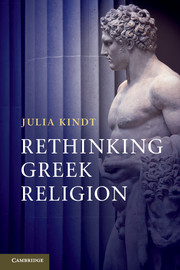Book contents
- Frontmatter
- Contents
- List of Figures
- Acknowledgements
- List of Abbreviations
- Introduction
- Chapter 1 Beyond the polis: rethinking Greek Religion
- Chapter 2 Parmeniscus’ journey: tracing religious visuality in word and wood
- Chapter 3 On tyrant property turned ritual object: political power and sacred symbols in ancient Greece and in social anthropology
- Chapter 4 Rethinking boundaries: the place of magic in the religious culture of ancient Greece
- Chapter 5 The ‘local’ and the ‘universal’ reconsidered: Olympia, dedications and the religious culture of ancient Greece
- Chapter 6 ‘The sex appeal of the inorganic’: seeing, touching and knowing the divine during the Second Sophistic
- Conclusion
- Bibliography
- Index
Chapter 4 - Rethinking boundaries: the place of magic in the religious culture of ancient Greece
Published online by Cambridge University Press: 05 August 2012
- Frontmatter
- Contents
- List of Figures
- Acknowledgements
- List of Abbreviations
- Introduction
- Chapter 1 Beyond the polis: rethinking Greek Religion
- Chapter 2 Parmeniscus’ journey: tracing religious visuality in word and wood
- Chapter 3 On tyrant property turned ritual object: political power and sacred symbols in ancient Greece and in social anthropology
- Chapter 4 Rethinking boundaries: the place of magic in the religious culture of ancient Greece
- Chapter 5 The ‘local’ and the ‘universal’ reconsidered: Olympia, dedications and the religious culture of ancient Greece
- Chapter 6 ‘The sex appeal of the inorganic’: seeing, touching and knowing the divine during the Second Sophistic
- Conclusion
- Bibliography
- Index
Summary
[T]hat heterodox and often arcane aspect of religion known as ‘magic’.
Roy KotanskyThe phenomenon of magic…cannot be separated from any serious understanding of ancient Greek religion.
Robert FowlerReligion contains magic, as one specific religious form.
Fritz GrafINTRODUCTION
In her once-influential book Prolegomena to the Study of Greek Religion (1903) Jane Ellen Harrison sketched a picture of ancient Greek religion in which the category of magic formed a central component of the religious. Influenced by evolutionary anthropology as practised by Frazer and others, Harrison sought to uncover an earlier, more ‘primitive’ stratum of ancient Greek religion, which significantly pre-dated the anthropomorphic conception of the Greek gods and goddesses living in an ordered divine society on Mount Olympus as propagated in particular by Homer and Hesiod (Olympianism). This prehistoric stratum, she argued, was still visible in religious phenomena such as witchcraft, purification and mysteries, all practices that Olympianism had eventually driven underground. It was also evident in festivals such as the Thesmophoria, which were ‘left almost uncontaminated by Olympian usage’. Harrison, then, focused on magical elements in such festivals and practices in order to access earlier stages in the development of ancient Greek religion – with the effect that magic became an ubiquitous feature within her oeuvre.
- Type
- Chapter
- Information
- Rethinking Greek Religion , pp. 90 - 122Publisher: Cambridge University PressPrint publication year: 2012



